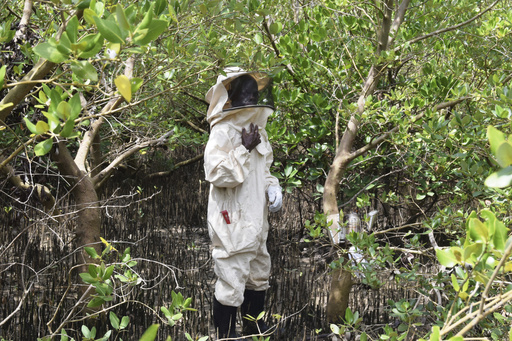In Mombasa, Kenya, Peter Nyongesa, 69, tends to his beehives along the Indian Ocean coast, wearing protective gear and carrying a smoker. Disheartened by the persistent logging of mangroves, Nyongesa has resorted to using bees as a deterrent against loggers who harm the vital ecosystems. He recalls unsuccessfully asking loggers to spare the mangroves, leading him to deploy bees hidden in the mangroves, poised to sting intruders.
Mangroves, essential for preventing erosion and mitigating severe weather impacts like cyclones, are under threat globally. The International Union for Conservation of Nature Red List of Ecosystems reported that more than half of the world’s mangrove ecosystems face collapse due to factors such as illegal logging, climate change, pollution, and urban development.
In Mombasa county alone, it is estimated that nearly half of the mangrove area, amounting to 1,850 hectares (4,570 acres), is degraded. Efforts to conserve mangroves have been spearheaded by communities like Tulinde Mikoko, a local conservation group advocating for mangrove protection through initiatives like beekeeping and tree planting. James Kairo, a research scientist, mentioned that community-driven initiatives such as beekeeping not only aid in conservation but also generate income through the sale of high-quality mangrove honey.
Nyongesa, who harvests about 8 liters (2 gallons) of honey every three months from 11 beehives, has found beekeeping to be a sustainable source of income while contributing to mangrove conservation efforts. Bees intentionally placed in mangroves not only deter loggers but also serve as vital pollinators, enhancing plant reproduction within the ecosystem.
Although challenges persist in measuring the impact of such conservation tactics, organizations like the UNEP-Nairobi Convention emphasize integrating livelihoods with conservation practices. Mangroves in Kenya cover 54,430 hectares (134,500 acres) and contribute significantly to the national economy, generating $85 million annually, according to the Global Mangrove Alliance.



